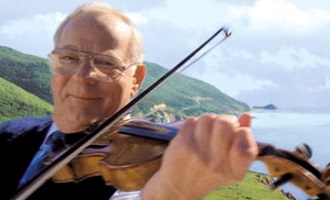Tribute to a Celtic Icon – The Passing of Buddy MacMaster
"Buddy MacMaster brought Cape Breton music to the world and influenced a generation of Celtic musicians. His gift of music will live on for generations to come." – Nova Scotia Premiere Stephen McNeil
Transceltic mourn the passing of Buddy MacMaster. Widely recognized as the Master of the genre of Cape Breton Fiddling, he is considered by many to be principally responsible for the resurgence of this unique musical tradition. The success of which has helped galvanize the Scots Gaelic community of Nova Scotia’s Cape Breton and spurred what many have called the Gaelic renaissance. In 2000 Buddy Macmaster was awarded the “Order of Canada” and the citation accompanying this award included the following accolade: “...as Ambassador of Canadian music and a mentor to many, he is leading a Gaelic renaissance in Canada and abroad.”
Buddy MacMaster, acclaimed “Father” of the Celtic renaissance in Cape Breton, passed away on August 20, 2014 at the age of 89. According to his obituary appearing in the Cape Breton Post, he is survived by his wife Marie and children Allan and Elizabeth. Elizabeth is a musician in her own right and Allan is an elected member of the Nova Scotia House of Assembly and in March 2010 introduced a Gaelic resolution in the Nova Scotia House of Assembly, asking for continued government support for Gaelic language, history and culture in Nova Scotia. It was passed unanimously by all members.
Buddy MacMaster was born into a Gaelic speaking family in 1924 and performed publicly for the first time at age 12 and was a tireless devotee of Cape Breton fiddling for the rest of his life. He worked full time for the Canadian National Railway whilst raising a family. He never stopped playing the fiddle and it is in part through his dedication and perseverance that the legacy of the Gaelic music of Cape Breton has survived and flourished.
Natalie MacMaster, the international super star of Gaelic fiddling is Buddy MacMaster’s niece. In September 2013 Transceltic had the privilege of interviewing Natalie. In the article that accompanied the interview, the younger MacMaster is described as follows: “With two Grammy nominations, numerous music awards and multiple Gold Albums, Natalie MacMaster is an internationally renowned fiddler in the forefront of the revival of Scots Gaelic musical traditions of Cape Breton. MacMaster is more than the take-away from her image of a polished, beautiful super star of popular Celtic culture. She is also Cape Breton musical royalty; the niece of the legendary Buddy MacMaster…In a biographical sketch of her uncle Buddy written by Paul MacDonald it was noted that Natalie’s grandmother (Buddy MacMaster’s mother) was accomplished at lilting, a form of traditional singing common to the Gaelic speaking areas of Ireland and Scotland, and would sing these magical songs for her family in her home. Thus, the musical talent, fame and success has come by her “honestly”.
In an article posted to the CBC website, Natalie MacMaster is quoted assessing the impact her Uncle Buddy has had on Cape Breton fiddling: “The great impression he left on me was more about being generous with your music because Buddy played everywhere. I don’t think he turned down a gig that he could do. He did it because he didn’t want to let anyone down. That’s what is right to do. If we’re given these talents they are for ourselves but they are also for everyone else.”
Musical Traditions Internet Magazine in a 2000 review of Buddy MacMaster’s CD “Judique Flyer” deftly places the musical genius of Buddy MacMaster into the historical and cultural context of Cape Breton:
“Cape Breton music is dance music. The characteristic combination of instruments for the solo and social dance is the two person band of fiddle and piano accompaniment. The history of why Cape Breton should be such a stronghold of Celtic fiddle music is fascinating. During the late eighteenth and early nineteenth centuries the Highland Clearances gave rise to the large number of Scottish immigrants from the Highlands and Islands. By 1851 there were estimated to be 120,000 Scots in Cape Breton. The Highland traditions of Scotland were maintained and nurtured and Scottish place names were transported to the new world along with the traditional music and Gaelic language. Geographically isolated for the first 150 years or so the music, language and cultural traditions flourished. Buddy MacMaster was born just before a time of rapid change in communication and transportation which ended the isolation of Cape Breton and led to the rapid decline of the Gaelic language. The traditional music however has retained its importance in the community and has gained its own unique style and stature.”
http://www.transceltic.com/scottish/interview-natalie-macmaster-keeping-culture-alive-fiddle
- Emmett McIntyre's blog
- Log in to post comments







